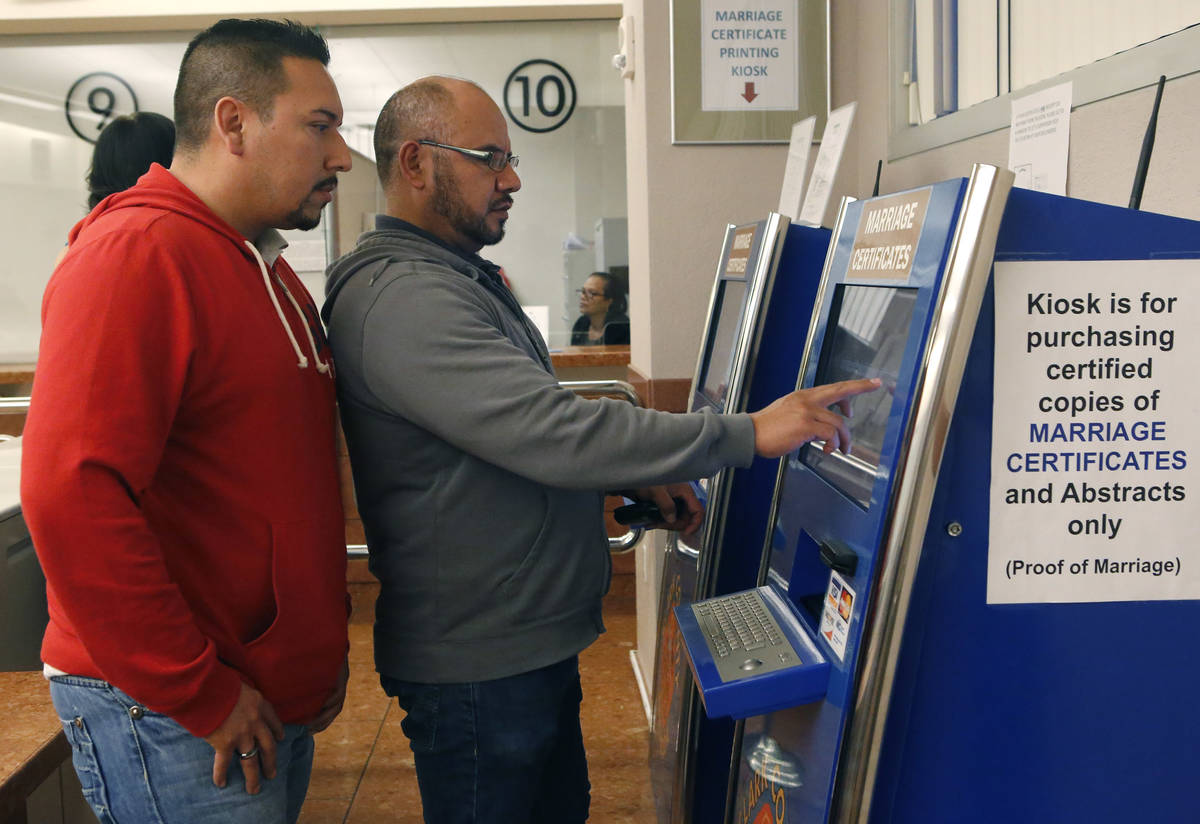STEVE SEBELIUS: Gay marriage in Nevada, then and now
Twenty years ago, Nevada voters began the process of amending the state constitution to outlaw gay marriage.
Question 2 was a simple amendment: “Only a marriage between a male and a female person shall be recognized and given effect in this state.” It passed overwhelmingly in 2000 (70 percent to 30 percent) and in 2002 (67 percent to 33 percent).
In one of my first columns for the Review-Journal in January 2000, I wrote that the measure was “flatly wrong,” that it was “final proof that there really are people out there who want to legislate their sectarian morality on the rest of us” and an example of H.L. Mencken’s definition of puritanism, “the haunting fear that someone, somewhere may be happy.”
Since then, a lot has changed in Nevada and across the country on the issue.
The man behind the initiative, Richard Ziser, ran against Harry Reid for the U.S. Senate in 2004 and lost badly, 61 percent to 35 percent. He’s since faded from the scene.
National attitudes toward gay marriage have shifted strongly, repudiating such indignities as former President Bill Clinton’s “Don’t Ask, Don’t Tell” policy for the U.S. military and his signing of the disgraceful Defense of Marriage Act in 1996.
In 2012, speaking on “Meet the Press,” former Vice President Joe Biden announced he was “absolutely comfortable” with gay marriage, and his old boss, former President Barack Obama — once an opponent — eventually changed his mind, too.
In 2014, the legal landscape in Nevada began to change. A lawsuit was filed seeking to invalidate the constitutional provision (and a companion state law). Initially, Nevada defended that lawsuit.
But then the 9th U.S. Circuit Court of Appeals ruled in the case of SmithKline Beecham Corp. v. Abbott Laboratories that it was unlawful discrimination to remove a gay person from a jury because of sexual orientation. That ruling — and its implications — led then-Attorney General Catherine Cortez Masto to abandon the state’s defense of the law.
The 9th Circuit made it official in October 2014, striking down Nevada’s constitutional ban and paving the way for ceremonies to proceed. (That ruling was delayed slightly by the shenanigans of recalcitrant U.S. District Court Judge Robert C. Jones, who had presided over the original case and whose ruling favoring the ban was thoroughly overturned. Rather than sign the order invalidating the law, he ultimately recused himself and let another judge do it.)
Then the U.S. Supreme Court — in its landmark Obergefell v. Hodges ruling in 2015 — held that the fundamental right to marry is guaranteed by the Due Process Clause and the Equal Protection Clause of the 14th Amendment.
After those legal victories, the Legislature in 2017 passed a law that allowed for marriages between two people, regardless of gender. And the state in that session passed Assembly Joint Resolution 2, which was approved in both the 2017 and 2019 sessions by significant majorities.
That resolution now sits before the voters in November as a proposed amendment that would excise the now-moot marriage language in the constitution and add language saying Nevada will accept all marriages, regardless of gender, that all marriages will be treated equally and that no religious organization or minister can be compelled to perform a marriage that goes against their beliefs.
Given the history of political movements in the country, the speed at which gay marriage has been accepted across the country has been nothing short of remarkable. Twenty years ago, the idea of limiting marriage to straight couples had more than two-thirds support among the electorate. Today, it’s very likely the opposite. What was once controversial and had many politicians at pains to explain themselves now barely raises an eyebrow among elected officials.
This is manifestly a good thing, a step toward equality under the law for all people, something this country is obviously still struggling to achieve for everyone, especially people of color. November gives Nevada voters a chance to exercise their voice, to rid the constitution of the dead-letter language of a bygone era and to extend the blessings of liberty slightly further.
It’s in this way — bit by bit, victory by victory — that we form the more perfect union discussed in the preamble to the Constitution and give new life and meaning to its words. Looking back 20 years from now, we may marvel not at the recognition of rights that were there all along, but that it took so long to uphold them.
Contact Steve Sebelius at SSebelius@reviewjournal.com or 702-383-0253. Follow @SteveSebelius on Twitter.























